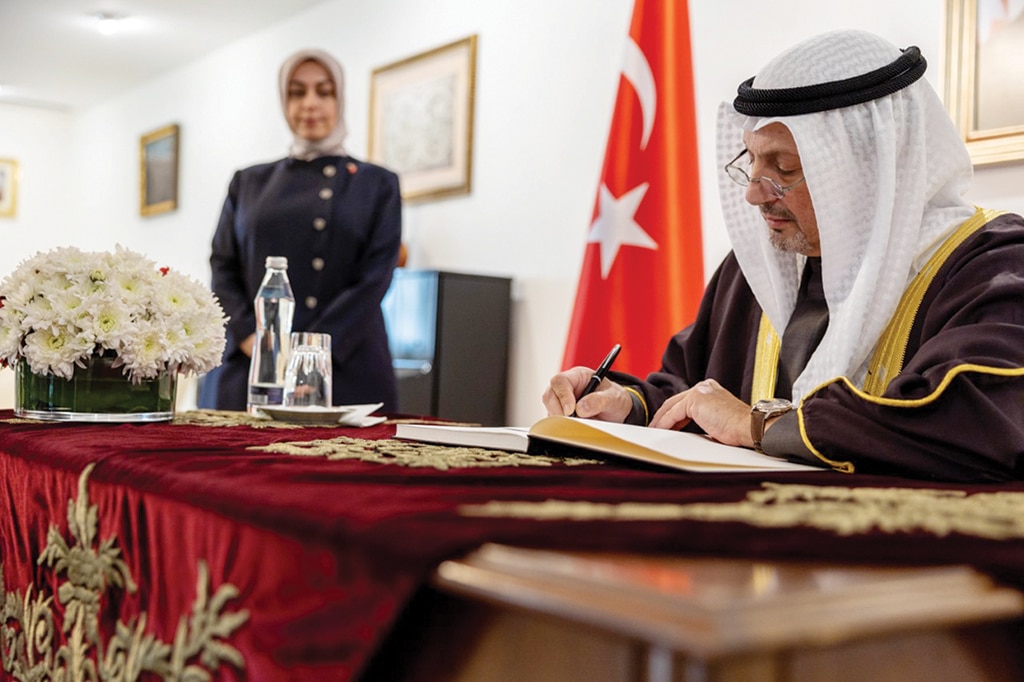KUWAIT: Kuwait's Foreign Minister Sheikh Salem Al-Abdullah Al-Sabah called his Turkish counterpart Mevlut Cavusoglu on Wednesday to reiterate, on behalf of Kuwait's political leadership, government and people, sincere condolences to the government and people of sisterly Turkey over the victims of the recent earthquake. He prayed to Almighty Allah to lodge the deceased in Paradise and grant the wounded a quick recovery.
The conversation also dealt with the instructions of HH the Amir Sheikh Nawaf Al-Ahmad Al-Jaber Al-Sabah regarding the dispatching of urgent assistance, including medical and security teams, to Turkey. The Turkish foreign minister conveyed the regards of Turkish leaders to Kuwaiti leaders, government and people, expressing gratitude for the disaster relief. Cavusoglu appreciated the launch of a lifeline for airlifting humanitarian aid from Kuwait, saying these assistances materialize the deep-rooted friendship and cooperation between both nations and Kuwait's distinctive humanitarian role around the globe.
In a message he inscribed in the condolence book at the Turkish Embassy, Sheikh Salem expressed deep sorrow and sincere solace on this grave calamity. He reiterated Kuwait's sympathy and solidarity with the Turkish people and its support to help them overcome the ramifications of this crisis. He also offered Kuwait's condolences to the families of the victims, wishing those injured a swift recovery, and for those missing to be found.
Turkish Ambassador to Kuwait Tuba Nur Sonmez expressed her sincere appreciation and gratitude to all the brotherly and friendly countries that are supporting Turkey financially and emotionally, praising the great role played by Kuwait and the minister of foreign affairs, who came to offer condolences in person and was in constant contact with her from the first moment of the earthquake, emphasizing the Kuwaiti political leadership's support for Turkey during this painful crisis.
Foreign Minister Sheikh Salem also said the wellbeing of nationals is the utmost priority. He underlined Kuwait's "rapid response" to the calamity, citing HH the Amir Sheikh Nawaf's instructions to provide immediate aid to the affected areas. Kuwait stands in solidarity with Turkey in the wake of the disaster, the minister underlined, hoping Ankara will get through this painful tragedy.
Meanwhile, Turkish President Recep Tayyip Erdogan on Wednesday conceded "shortcomings" after criticism of his government's response to the massive earthquake that killed over 11,700 people in Turkey and Syria. The sprawling scale of the disaster that flattened thousands of buildings, trapping an unknown number of people, has swamped relief operations already hampered by freezing weather. Survivors have been left to scramble for food and shelter - and in some cases watch helplessly as their relatives called for rescue, and eventually went silent under the debris.
Still, searchers kept pulling survivors from the debris three days after the 7.8 magnitude quake that is already one of the deadliest this century, even as the death toll continues to rise. As criticism mounted online, Erdogan visited one of the hardest-hit spots, quake epicenter Kahramanmaras, and acknowledged problems in the response. "Of course, there are shortcomings. The conditions are clear to see. It's not possible to be ready for a disaster like this," he said.
Twitter was also not working on Turkish mobile networks, according to AFP journalists and NetBlocks web monitoring group. The window for rescuers to find survivors is narrowing as the effort nears the 72-hour mark that disaster experts consider the most likely period to save lives. Yet on Wednesday, rescuers pulled children from under a collapsed building in the hard-hit Turkish province of Hatay, where whole stretches of towns have been levelled. Officials and medics said 9,057 people had died in Turkey and 2,662 in Syria from Monday's 7.8-magnitude tremor, bringing the total to 11,719 - but that could yet double if the worst fears of experts are realized.
The World Health Organization chief Tedros Adhanom Ghebreyesus has warned that time was running out for the thousands injured and those still feared trapped. Due to the scale of the damage and the lack of help coming to certain areas, survivors said they felt alone in responding to the disaster. The White Helmets, leading efforts to rescue people buried under rubble in rebel-held areas of Syria, have appealed for international help in their "race against time".
They have been toiling since the quake to pull survivors out from under the debris of dozens of flattened buildings in northwestern areas of war-torn Syria that remain outside the government's control. "International rescue teams must come into our region," said Mohammed Shibli, a spokesperson for the group known formally as the Syria Civil Defense. "People are dying every second; we are in a race against time," he told AFP from neighbouring Turkey.
The issue of aid to Syria was a delicate one, and the sanctioned government in Damascus made an official plea to the EU for help, the bloc's commissioner for crisis management Janez Lenarcic said. A decade of civil war and Syrian-Russian aerial bombardment had already destroyed hospitals, collapsed the economy and prompted electricity, fuel and water shortages.
The European Commission is "encouraging" EU member countries to respond to Syria's request for medical supplies and food, while monitoring to ensure that any aid "is not diverted" by President Bashar Al-Assad's government, Lenarcic noted. Dozens of nations, including the United States, China and the Gulf States have pledged to help, and search teams as well as relief supplies have already arrived.
A winter storm has compounded the misery by rendering many roads - some of them damaged by the quake - almost impassable, resulting in traffic jams that stretch for kilometers in some regions. The European Union was swift to dispatch rescue teams to Turkey after the massive earthquake struck the country on Monday close to the border with Syria. But it initially offered only minimal assistance to Syria through existing humanitarian programs, because of EU sanctions imposed since 2011 on Assad's government over its brutal crackdown on protesters that spiraled into a civil war.











